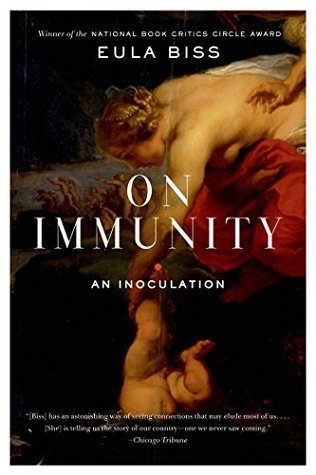More on this book
Community
Kindle Notes & Highlights
Obscure notations next to the times indicate, I think, waking, sleeping, nursing, and crying. I was searching for a pattern, trying to determine what made my baby cry inconsolably. What made him cry, I would learn much later, was an intolerance to cow’s milk. Offending proteins from the milk I drank passed through my milk to him—a possibility that had not occurred to me.
In 1901, a vaccine contaminated with tetanus bacteria killed nine children in Camden, New Jersey.
The middle class may be “threatened,” but we are still, just by virtue of having bodies, dangerous. Even the little bodies of children, which our time encourages us to imagine as absolutely vulnerable, are dangerous in their ability to spread disease.
But when relatively wealthy white women vaccinate our children, we may also be participating in the protection of some poor black children whose single mothers have recently moved and have not, as a product of circumstance rather than choice, fully vaccinated them.
Our own adaptive immune system, the branch of our immune system that develops long-lasting immunity, is thought to have borrowed its essential technology from the DNA of a virus.
This technology was viral technology before it was ours. Of humans and viruses, the science writer Carl Zimmer observes, “There is no us and them.”
It is only when disease manifests as illness that we see it as unnatural, in the “contrary to the ordinary course of nature” sense of the word. When a child’s fingers blacken on his hand from Hib disease, when tetanus locks a child’s jaw and stiffens her body, when a baby barks for breath from pertussis, when a child’s legs are twisted and shrunken with polio—then disease does not seem natural.
But as the immunologist Franco Celada proposed in a paper titled “Does the Human Mind Use a Logic of Signs Developed by Lymphocytes 108 Years Ago?” our minds may have learned the ability to interpret from our bodies.
It was croup, a swelling of the throat caused by a viral infection.
Cold air, a traditional treatment for croup, had eased the swelling and reduced his stridor on the way to the hospital.
Capitalism has already impoverished the working people who generate wealth for others. And capitalism has already impoverished us culturally, robbing unmarketable art of its value. But when we begin to see the pressures of capitalism as innate laws of human motivation, when we begin to believe that everyone is owned, then we are truly impoverished.
It wasn’t this that brought me to tears. It was that I had already, in that first year of my child’s life, discovered that some disposable diapers contained a chemical that gave him a red burning rash.
Either way, prevention, of war as well as disease, is not our strong point. “The idea of preventive medicine is faintly un-American,” the Chicago Tribune noted in 1975.
Our tendency toward prejudice can increase whenever we feel particularly vulnerable or threatened by disease. One study has suggested, for instance, that pregnant women become more xenophobic in the early stages of pregnancy. The more vulnerable we feel, sadly, the more small-minded we become.


